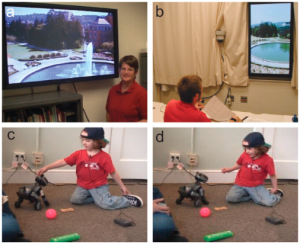The Human Relation with Nature and Technological Nature
Citation
Kahn, P. H., Jr., Severson, R. L., & Ruckert, J. H. (2009). The human relation with nature and technological nature. Current Directions in Psychological Science, 18(1), 37–42.
Abstract

Two world trends are powerfully reshaping human existence: the degradation, if not destruction, of large parts of the natural world, and unprecedented technological development. At the nexus of these two trends lies technological nature—technologies that in various ways mediate, augment, or simulate the natural world. Current examples of technological nature include videos and live webcams of nature, robot animals, and immersive virtual environments. Does it matter for the physical and psychological well-being of the human species that actual nature is being replaced with technological nature? As the basis for our provisional answer (it is ‘‘yes’’), we draw on evolutionary and cross-cultural developmental accounts of the human relation with nature and some recent psychological research on the effects of technological nature. Finally, we discuss the issue—and area for future research— of ‘‘environmental generational amnesia.’’ The concern is that, by adapting gradually to the loss of actual nature and to the increase of technological nature, humans will lower the baseline across generations for what counts as a full measure of the human experience and of human flourishing.
Technology has begun to change our species’ long-standing experiences with nature. Now we have technological nature—technologies that in various ways mediate, augment, or simulate the natural world. Entire television networks, such as the Discovery Channel and Animal Planet, provide us with mediated digital experiences of nature: the lion’s hunt, the Monarch’s migration, or a climb high into the Himalayan peaks. Video games like Zoo Tycoon engage children with animal life. Zoos themselves are bringing technologies such as webcams into their exhibits so that we can, for example, watch animals from the leisure of our home or a café. Inexpensive robot pets have been big sellers in the Wal-Marts and Targets of the world. Sony’s higher-end robot dog AIBO sold well. Real people now spend substantial time in virtual environments (e.g., Second Life).
In terms of the physical and psychological well-being of our species, does it matter that we are replacing actual nature with technological nature? To support our provisional answer that it does matter, we draw on evolutionary and cross-cultural developmental accounts of the human relation with the natural world and then consider some recent psychological research on the effects of technological nature.